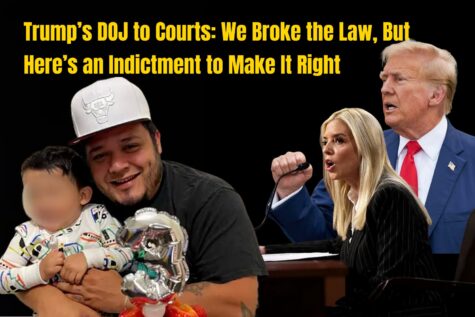When former President Donald Trump took office (again), he wasted no time wielding his executive pen like a sword. A slew of executive orders aimed at slashing federal spending—ranging from foreign aid to diversity initiatives—signaled his latest attempt to reshape government priorities. However, as history often reminds us, the U.S. Constitution has a tendency to step in and say, “Not so fast.”
One such roadblock arrived in the form of a Rhode Island federal judge’s ruling. Chief Judge John McConnell Jr. recently blocked Trump’s broad-based spending freeze, ‘Vox Ian Millhiser‘ reported a possible insider citing none other than Supreme Court Justice Brett Kavanaugh. Yes, the same Kavanaugh who once penned a rejection of the impoundment theory—the idea that a president can simply refuse to spend money that Congress has appropriated. This citation sets the stage for what could be a blockbuster legal showdown before the Supreme Court, where conservative justices may have to choose between legal precedent and political allegiance.
The Ghost of Impoundment Past: A Constitutional No-No
The notion that a president can withhold Congress-approved spending is not new, but it is largely considered unconstitutional. Impoundment, as this legal theory is called, was dealt a decisive blow in the 1970s when Congress passed the Impoundment Control Act. The law was a direct response to Richard Nixon’s enthusiasm for cutting funding to programs he didn’t particularly like—a move Congress found less than charming.
Judge McConnell, in his ruling, leaned heavily on a 2013 opinion written by none other than Brett Kavanaugh, back when he was still an appellate judge. Kavanaugh firmly rejected impoundment, even citing a 1969 Department of Justice memo that stated, “It is in our view extremely difficult to formulate a constitutional theory to justify a refusal by the President to comply with a congressional directive to spend.”
Translation? Presidents don’t get to pick and choose which funds they want to spend, no matter how much they dislike the programs in question.
Trump’s Supreme Court Dilemma: Friendly Fire Ahead?
Trump’s fate on this issue may rest in the hands of the Supreme Court, but this is where things get tricky. While the current Court holds a 6-3 Republican supermajority, past statements from two key conservative justices—Kavanaugh and Chief Justice John Roberts—suggest that Trump’s impoundment bid is on thin ice.
Roberts, during his time as a Reagan-era lawyer, wrote a memo declaring it “clear” that the president cannot impound funds in “normal situations.” Kavanaugh’s stance, as mentioned earlier, also aligns with the view that a president does not have unilateral spending power. If both justices stick to their prior opinions—and resist any sudden changes of heart—Trump could find himself in the unusual position of being outvoted by his own judicial appointees.
Legal Scholars Sound the Alarm: A ‘Blitzkrieg’ on the Constitution
Legal experts are not mincing words about Trump’s latest maneuver. Harvard Law’s Laurence Tribe described the spending freeze as a “blitzkrieg on the law and the constitution,” accusing Trump of using sheer volume to overwhelm the system. Erwin Chemerinsky of Berkeley Law echoed these concerns, warning of a dangerous erosion of constitutional norms.
The court battle is still unfolding, but one thing is clear: if the Supreme Court upholds its own precedents, Trump’s spending freeze may soon find itself in the judicial graveyard alongside Nixon’s impoundment attempts. But with a Court that has recently shown surprising flexibility on presidential immunity, nothing is entirely certain.
The Republican Majority’s Moment of Truth
While Trump may hope for a favorable ruling, the Republican-dominated Court could be his biggest obstacle. If Kavanaugh and Roberts stick to their previous views, and the three Democratic-appointed justices predictably vote against impoundment, Trump’s freeze will likely be declared unconstitutional.
That leaves the question: will loyalty to the Republican president override decades of legal precedent? If the Court rules in favor of Trump, it would mark a radical departure from established constitutional principles. If they rule against him, it could be a rare moment where law triumphs over partisan interests. Either way, the decision will set a precedent that could reshape executive power for years to come.
So, will Kavanaugh and Roberts hold the line, or will Trump’s Supreme Court majority prove as flexible as a campaign promise? Stay tuned—this legal drama is far from over.














